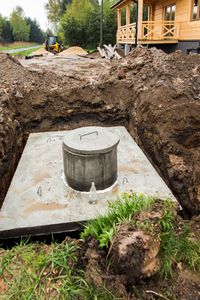What Septic System & Sewer Line Services Does Insurance Cover?

Whether you're dealing with a septic system or sewer line, the need for repairs tends to appear when you least expect it. This can take a major toll on your budget, especially if you're unsure of how much, if any, of these repairs your homeowner’s insurance will cover. Even if your particular plan doesn't include every aspect of your septic or sewer system, it helps to have a better idea of what you can do to prevent the worst-case scenario from happening in the first place.
Septic System Coverage & Solutions
Does Insurance Cover Septic & Sewer Issues?
Despite the fact that your septic system and sewer lines are an integral aspect of your property, not all homeowners insurance plans include them in coverage. Certain insurance policies will cover septic problems, while others only do so on a limited basis. It's possible to purchase optional extra coverage for these and other specific issues, but you'll want to check rates with your provider before doing so.
Sewer line repairs, on the other hand, are rarely included in homeowners insurance. This can be particularly troublesome, especially when you factor in the high costs associated with sewer line damage. One of the reasons behind lack of coverage in both cases is how much of these repairs come down to human error. Research has found the flushing of foreign objects, poor maintenance practices, and other actions (or lack thereof) on behalf of the homeowner to be among the leading causes of septic system failure.
How Can You Avoid Paying Out of Pocket?
 If you find your particular insurance plan doesn't cover septic or sewer issues, don't panic. The best course of action is to take preventive measures that will stave off the need for repairs, in addition to know what type of maintenance to sign up for and how often you should be doing so. In the case of septic systems, you'll want to have professional inspections performed at least once every three years. Septic tank pumping typically takes place every three to five years.
If you find your particular insurance plan doesn't cover septic or sewer issues, don't panic. The best course of action is to take preventive measures that will stave off the need for repairs, in addition to know what type of maintenance to sign up for and how often you should be doing so. In the case of septic systems, you'll want to have professional inspections performed at least once every three years. Septic tank pumping typically takes place every three to five years.
As for sewer lines, you should have them cleaned every 18 to 22 months. Typical warning signs that indicate a need for immediate cleaning include the penetration of tree roots, loose or "bellied" piping, and the presence of grease within the pipes. Don't wait for backup to occur; contact the professionals for hydro-jetting and other thorough cleaning methods, and you won't have to worry about paying out of pocket for expensive repair work.
For residential and commercial customers throughout New Haven County and the surrounding areas, Sanitrol Septic Services, LLC, of North Branford, CT, has been the ultimate source for septic system inspections and pumping since 1984. They'll help you avoid backup and the need for expensive repairs with regularly scheduled cleanings, and they have 24/7 pumping services in case an emergency arises. Head to their website for more information about services, and call them at (203) 315-3202 to make an appointment today.
About the Business
(5 reviews)
Have a question? Ask the experts!
Send your question
